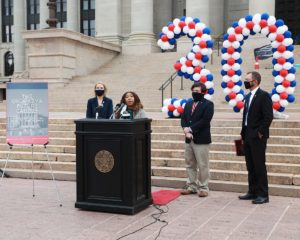Tulsa Race Massacre: Elected Officials On When They Learned About It And How It Influences Them
“For me, it’s a little bit different because my family includes Tulsa Race Massacre survivors. So I learned about it fairly early because my great, great grandfather had a grocery in Tulsa. So I probably learned about it at home from my family. But even in our family, it is still a bit of a hush-hush topic. When it started being taught in school and other people started talking about it, that’s when I started getting into it more and started asking, why are we talking about this all the time and why don’t more people know. We took tours, we went to see the brick in Tulsa with our family’s name on it and where (my great grandfather’s) business was. And since then we have really dived into it and have been trying to find things like bank statements and land records over the past several years.”
“What we saw during this legislative session was the most culturally insensitive that I’ve seen and I’ve been around since my mom (former Sen. Anastasia Pittman) had been in office. And so in these moments, it’s disheartening to have conversations about how we move forward when we can’t talk about where we came from. Since people covered it up all those years, it has still created generational fear and generations of people not understanding the topic or the pain. Now we are in 2021, 100 years later, and we are still fighting for the acknowledgment, still fighting to understand what happened and its magnitude. We could’ve been so much farther along had we acknowledged it so much sooner and had the hard conversations with each other.”

Visit Oklahoma Watch to view the full article.
Never miss any important news. Subscribe to our newsletter.
Related News
Pittman Honors Tuskegee Airmen with an Annual Day
Pittman Pleased With Removal Of Oklahoma County Northeast Jail Location
Front and center | Candidate Ajay Pittman
Representative-Elect Ajay Pittman | Featurette
United Voice: Nikki Nice Hosts Town Hall Meeting For Black Elected Officials
Bottle Service bill passes Houses
Representative Ajay Pittman to host community education forum
Are you Smarter than a KIPPster?

Oklahoma forms bipartisan, bicameral Future Caucus
Our Social Networks
Never miss any important news. Subscribe to our newsletter.
Information
- Disclaimer
- Privacy Policy
- Abuse Report
- Advertisement Policy
- Terms & Conditions
Copyright 2021 News Atlas. All rights reserved.
